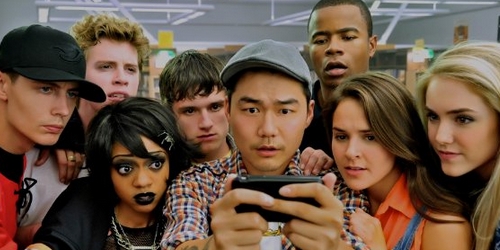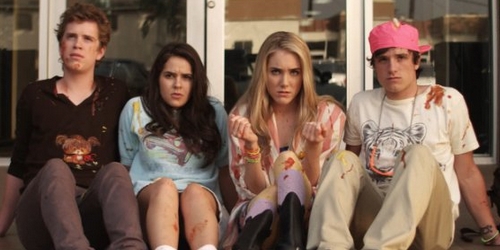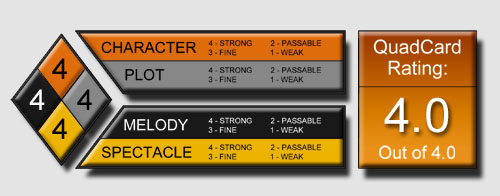
(Author’s note: a few weeks ago I participated in a round table interview with Detention director Joseph Kahn. That feature was published over on my site, A Constant Visual Feast; it makes for a great read in conjunction with the review itself. Go here to read the interview if you haven’t already!)
There’s really no good preamble one can fashion to properly introduce Joseph Kahn’s sophomore feature length film, Detention, in a review; temptation and delusions of wit both want to nudge me into describing it as a film so utterly, enthusiastically, uniquely bonkers that it would behoove any cinephile to pay the purchase price of a ticket to watch it. And so there you have it– Detention, no matter how you may feel regarding its innumerable cinematic and cultural influences, absolutely must be seen to be believed. If Edgar Wright started pushing toward an entirely new sort of filmmaking in 2010’s Scott Pilgrim vs. the World, then Kahn not only continues that advance but improves on it with his own brand of sly, insightful, attention span stretching cinematic vision and imagination.
If nothing else, Detention immediately earns the crown of “best horror-kung fu-time travel-high school-drama-comedy movie of all time“.  At a glance that sounds like faint praise; frankly, Kahn’s film is just that singular. When critics and film writers describe Detention as being unlike anything you’ve ever seen, trust them. Garbing itself in the framework of the classic slasher film, Detention tours through the halls of Grizzly Lake High School as its students are stalked and butchered by Cinderhella– the villain of the Scream analogue in Kahn’s cinematic world, who appears to have come to murderous life. But forget the slowly rising body count; these kids are just worried about graduation, or prom, or suffering the ignominy of being at the bottom of the social totem pole at school, or avoiding their girlfriend’s hyper-aggressive brute of an ex. Being a teen is hard enough without worrying about being eviscerated by a masked madman.
At a glance that sounds like faint praise; frankly, Kahn’s film is just that singular. When critics and film writers describe Detention as being unlike anything you’ve ever seen, trust them. Garbing itself in the framework of the classic slasher film, Detention tours through the halls of Grizzly Lake High School as its students are stalked and butchered by Cinderhella– the villain of the Scream analogue in Kahn’s cinematic world, who appears to have come to murderous life. But forget the slowly rising body count; these kids are just worried about graduation, or prom, or suffering the ignominy of being at the bottom of the social totem pole at school, or avoiding their girlfriend’s hyper-aggressive brute of an ex. Being a teen is hard enough without worrying about being eviscerated by a masked madman.
Kahn has his finger firmly on the pulse of pop culture; he’s made a career out of directing music videos for the last twenty years, a profession which by virtue of its very nature keeps its members up to date on the trends that define what’s modern and cool. The label is often and unjustly wielded as a negative, but Kahn’s background informs the entire language and pulse of Detention in refreshing, invigorating, and often eye-opening ways. It defines the propulsive, kinetic momentum of every single sequence and sets a high benchmark for its viewers in terms of processing capacity– or, put simply, Detention moves with such a relentless gait that to drop one’s attention for even a second is to miss out on a line of dialogue or an image in the frame that’s integral toward absorbing the film’s core ideas and themes. Detention demands your utmost concentration.
That central appeal to our diligent scrutiny and thoughtfulness almost feels at odds with a cast of teens living in the ADD age, but the film itself isn’t scatterbrained. If anything, Detention so strongly invests itself in the mores of modern communication, information consumption, and participation in pop culture at large, that it can’t help but come off as somewhat schizophrenic, but that giddy, fractious capriciousness actually proves to be one of the film’s greatest strengths. Conversations are had entirely through text messages, for which Kahn obligingly provides visual representation; obscure references to 90s television are supplemented by a flash image of a Wikipedia search that explains the citation in question. And through synthesizing the DNA of these cultural footnotes, Detention ends up breaking them down to their base components before reforging all of the material included here into something unequivocally fresh, new, and exciting.

In more straightforward terms, Detention deconstructs pop culture to yield commentary on it, ranging from astute observations to barbed satirical criticisms, but the film also refuses to be overtly, needlessly heady. Yes, there’s an enormous amount going on in every single frame. Yes, primarily the film concerns itself with breaking down social constructs and examining what lies beneath them. But those endeavors are driven by an undercurrent of sweetness and joy that permeates the entire picture. Part of that comes from a clear fondness for the topics that the film touches on– not nostalgia per se, though two of the movie’s principles certainly embody that sort of wistful era worship, but more just a general respect and non-ironic love for horror films, everything 90s, science fiction, and teen genre storytelling.
The other part comes from a very clear sense that Kahn cares about his characters. He genuinely likes them. And why not? They’re all, more or less, a lot of fun to hang around with. One of Detention‘s best pleasures is just watching these kids inhabit the screen and interact with each other; they’re quick, they’re funny, they’re actually interesting despite their various quirks and proclivities. If you’re not an immediate fan of Josh Hutcherson’s skateboarding music aficionado, or Shanley Caswell’s angst-ridden social pariah (also known as “the most rational person in the room”), then you’re facing a clear sign that Detention probably isn’t for you– but Kahn’s such an effusive admirer of these characters that you’d do well to give them all a second chance.

Granted, he’s also made a film whose plot hinges on introducing some of these characters to their deaths, but for its ties to horror, Detention isn’t a straight-up horror film; that’s just the shell Kahn uses to house his narrative and explore his themes. Huge stretches of the story involve everything from time travel to body swapping to that aforementioned high school drama to pseudo superhero origin stories to…well, the list is endless. Detention always ties back to Cinderhella, and offers up a critique of how modern horror cannibalizes and recycles itself endlessly, but even those elements can be interpreted as comments on broader issues of media consumption in the information age. Describing the film purely through a horror lens downplays its multi-faceted, multi-genre proclivities.
G-S-T RULING:
Ultimately, Detention‘s biggest takeaway for me is its mutability. It’s a film that changes through multiple viewings. That’s not to say that you won’t perceive Detention the same way twice, but rather that each viewing adds something new and different to your preceding experiences with it. I’ll also comfortably dub it a film its period, the kind of cinema we’ll look back on years from now as a reminder of what the 2010s looked and sounded like. But it’s so much more, too. With Detention, Kahn has nuked pop culture and an era of social networking and technology from orbit so as to give us the opportunity to study them at the atomic level; in doing so, maybe we’ll see each element from a completely renewed and altered perspective.

